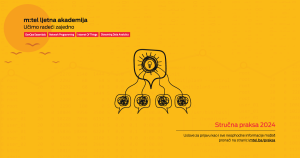SARAJEVO, April 18 (FENA) - None of the three serious rounds of negotiations on Bosnia and Herzegovina's constitutional changes - "The April Package" (2006), "The Prud Agreement" (2008) and "The Butmir Agreement" (2009), included women as equal participants in the negotiation process.
This was one of the reasons why several NGOs launched the "Female Citizens for Constitutional Change" initiative, which advocates for a Constitution of Bosnia and Herzegovina that will ensure greater protection of human rights and freedoms, with a special focus on the gender perspective.
The initiative, which has long cooperated with the BiH Agency for Gender Equality, which operates within the BiH Ministry of Human Rights and Refugees, was formed by women activists from all over BiH, who want to encourage all citizens to use their knowledge, energy and willingness to reciprocate action and contribute to the fulfillment of the goals of the Initiative.
Director of the Agency for Gender Equality of BiH Samra Filipović-Hadžiabdić reminded in an interview with FENA that the Agency, the Ministry of Human Rights and Refugees of BiH in 2007, in cooperation with the Gender Center of the Federation of BiH and the Gender Center of the entity of Republika Srpska prepared the amendments to the BiH Constitution, as well as the constitutions of the FBiH and the RS.
A comparative analysis of the constitutions in the region and several countries around the world was made at the time, and a broader initiative was launched that included representatives of parliamentary commissions for gender equality, academia, women's NGOs, associations of persons with disabilities and national minorities.
A large regional conference was organized to exchange experiences, and after that, a narrow working group was formed which consolidated the conclusions and made amendments to the constitutions, which were subsequently sent to the competent institutions.
However, when it comes to the use of gender-sensitive language, Filipović-Hadžiabdić believes that this is not a constitutional-legal matter and that it is sufficiently regulated by the Law on Gender Equality of BiH.
Preparations are underway for amendments to the Law on Gender Equality, which go in the direction of harmonization with the latest directives of the European Commission, and, Filipović-Hadžiabdić notes, the law will be amended only in that area.
"The harmonization of the Law on Gender Equality with the directives of the European Union is one of the 14 priority requirements of the European Commission. Wider changes would require a different procedure, which cannot be achieved within the deadline set by the European Commission," she added.
Asked whether changes to the BiH Constitution would contribute to the full implementation of the Law on Gender Equality in BiH, given that the implementation of the law is incomplete, Filipovic-Hadžiabdić said that unfortunately in Bosnia and Herzegovina a satisfactory level of rule of law and respect for all laws has not yet been achieved.
"We are witnesses of disrespect for the decisions of constitutional courts. However, recently there has been noticeable progress in terms of the implementation of the Law on Gender Equality, as the number of court decisions under that law has increased," she explained.
He notes that the adoption of amendments to the BiH Constitution by consensus on the issue of full respect for gender equality would be ideal because that would send a message of full commitment of political actors in relation to this issue.
"Gender issues do not affect the area of national interests, which is the most sensitive issue in the BiH society and we certainly believe that this could be a point of unification and the possibility of joint action of the position and the opposition," she said.
She underlined that one cannot speak of a real democratic Constitution if women, who make up 50 percent of the population of Bosnia and Herzegovina, do not participate in its adoption.
"In order for the processes to be democratic, they must include representatives of different groups, because that is the only way to unite different interests through the constitution, laws and politics. It is especially important for constitutional amendments because it is the highest legal act that should contain principles and values that can be further elaborated by legal matter, policies, strategies and action plans," she emphasized.
The transitional and final provisions of the Gender Equality Act state that all laws should be harmonized with that law within six months. All institutions are obliged to submit acts to the Agency for an opinion on compliance with this law.
"As we have already prepared amendments to the BiH Constitution, we plan to meet the competent parliamentary commissions and take the next steps together, most likely to organize a thematic session," concluded the director of the BiH Gender Equality Agency Samra Filipović-Hadžiabdić in an interview with FENA.
(FENA) S. R.









